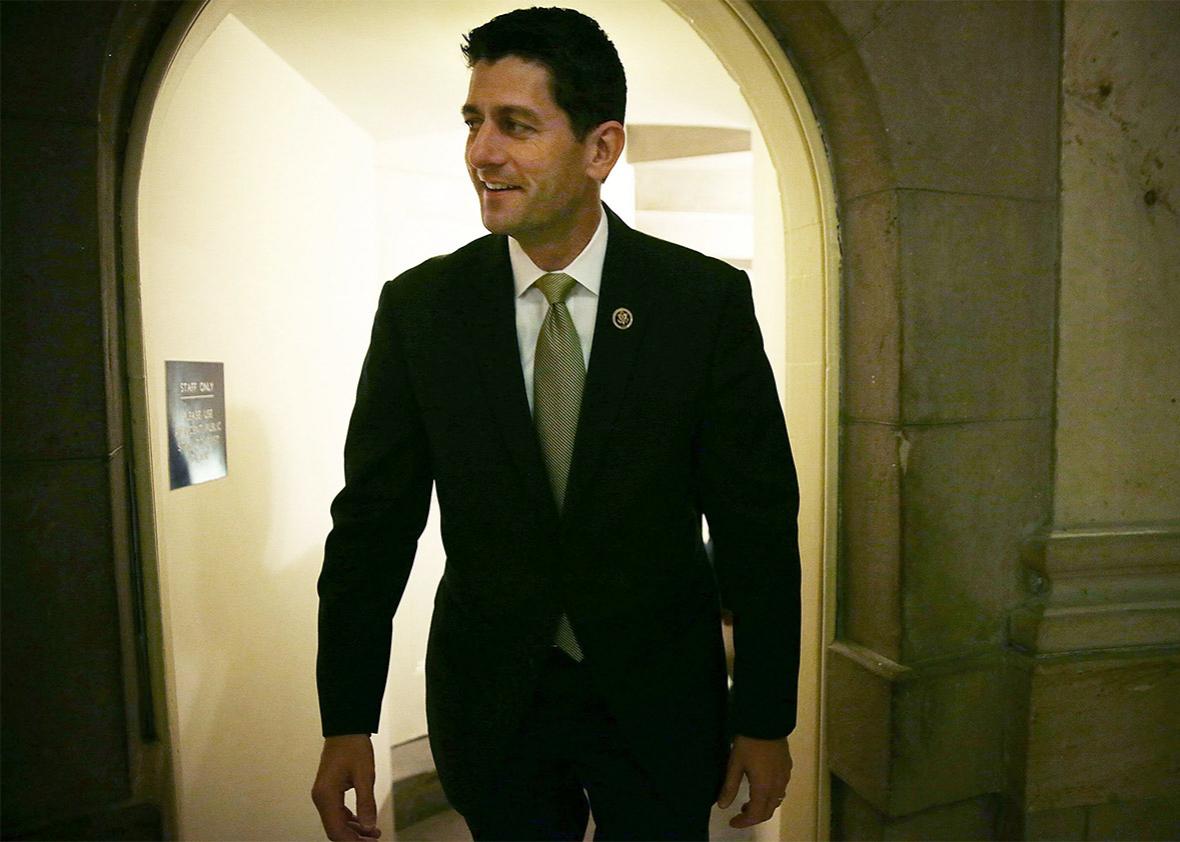The list of demands that would-be House Speaker Paul Ryan announced Tuesday night to the House Republican Conference produced no shortage of jokes. “KING PAUL: PLEDGE YOUR ALLEGIANCE” is how the always cool-tempered conservative linker Matt Drudge treated the news. Others considered an additional set of demands he might put forth in the style of a celebrity’s backstage rider.
Sure, some of the demands seemed more superfluous than others. He wants to work a relatively normal workday—no constant traveling to raise money so that he can spend more time raising his children. Well, fine. They can always lie to him about how he’ll never have to work late in order to get him to accept the job.
But the central demands—demand, really—that he’s putting forth is about more than an individual’s whims. It’s a question he’s posing directly to the Freedom Caucus and the conservative radicals who prop them up: Can a Republican majority smoothly govern the House of Representatives, or not? Ryan isn’t making demands upfront just to protect his leisurely deer-hunting lifestyle. He’s setting a marker of what’s required to repair the House under its current composition, and he’s leaving the Freedom Caucus with the bag.
Ryan has given GOP factions until Friday to decide whether they’ll support him, so that gives conservative media a precious couple of days to convince Freedom Caucus members to screw everything up. They’re off to a hot start. Conservative talker Laura Ingraham said on her Wednesday program, flat-out, that “Paul Ryan should not be Speaker of the House … find someone who won’t stick his or her finger into the eye of the electorate.” The similarly influential talker Mark Levin has been railing against Ryan as a tool of the same nefarious Republican establishment that insists on transferring American culture and sovereignty into the hands of undocumented immigrants. According to National Review’s reporting, Ryan allegedly offered conservatives a pledge not to call up a comprehensive immigration reform bill, as if there was a chance in hell of that ever happening anytime soon. If true, Levin and Ingraham will have to find some other line of argument, real or fabricated, to deploy against Ryan. I doubt they’ll have much trouble.
Ryan’s pitch doesn’t seem to be going well among Freedom Caucus members themselves, either. Ryan’s central demand is a rule change that weakens the motion to vacate the speaker’s chair—i.e., allows the speaker to do his job without constant threat of a coup. This is the tactic that conservatives were threatening to deploy against House Speaker John Boehner before he beat them to the punch with the classic you can’t fire me, I quit! maneuver. Conservatives are responding to this condition in their trademarked calm, cool, and measured way: by running around screaming about Thomas Jefferson. “The demands to change Jefferson’s rules on the motion to vacate the chair seems kind of arcane, but I think it has worked since 1801 so I think that should probably not be changed,” said Rep. Tim Huelskamp, one of those members who—to put it euphemistically—is always good for a quote. “If it was good enough for Thomas Jefferson I think it is good enough for us.” This Ryan guy thinks he’s better than Tom Jefferson, does he? Huelskamp added that he “never thought Paul Ryan would come in and say, ‘I want more power than John Boehner has.’ ” These are the sort of dolts that Ryan is trying to convince: Adults who honestly believe that Boehner had power over them, rather than the other way around.
As I wrote when Ryan was first considering taking the role, Ryan needed to make these sorts of conditions. There’s no point in either him or anyone else serving as speaker if they don’t, and he is supposedly the only member with enough cross-factional credibility to compel them into agreeing.
If House conservatives don’t accede to Ryan’s terms, the next speaker will be one of two types: someone who gives the Freedom Caucus whatever they want, which ultimately means more brush-ins with government shutdowns and debt ceiling breaches, or someone who can pull together a coalition of Republicans and Democrats. The latter would quite obviously represent the natural will of the House, but it also clashes with the current era of partisan polarization: It’s hard to see many Republicans voting for a speaker who cuts a deal with Nancy Pelosi. And the former just represents a continuation of the dysfunctional Boehner-era dynamics, with a figure who will be on a shorter leash than he ever was.
Ryan’s candidacy, under Ryan’s terms, marks the only hope for a barely functional House of Representatives for at least the remainder of the Obama administration. Sounds like a good deal to most members, but perhaps not the procedural radicals who must decide.
